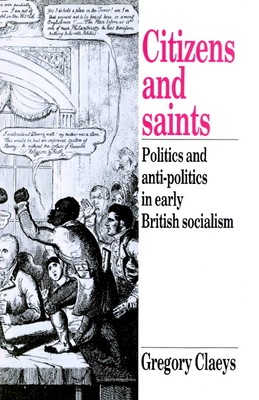
- We will send in 10–14 business days.
- Author: Gregory Claeys
- Publisher: Cambridge University Press
- Year: 2002
- Pages: 380
- ISBN-10: 0521892767
- ISBN-13: 9780521892766
- Format: 15.5 x 22.9 x 2.4 cm, minkšti viršeliai
- Language: English
- SAVE -10% with code: EXTRA
Reviews
Description
Citizens and Saints is a comprehensive study of the profound rupture in the language of reform and revolution which occurred with the rise of socialism. Focusing upon British Owenite socialism, Professor Claeys argues that two schools of political thinking emerged from the 'social' critique of contemporary political radicalism. One, largely identified with Owenite perfectibilism, aimed to transcend existing forms of democracy and to establish more harmonious, less divisive forms of rule. The other, apparently more democratic, aimed to extend popular control of political institutions to economic organisations. Both were sceptical of the 'political' analyses of socioeconomic deprivation proferred by existing radicalism. Such scepticism was to prove crucial to both liberal and socialist political thought, and Professor Claeys shows that such perennial questions as the intrinsically democratic (or otherwise) nature of Marxist socialism can only be understood by reference to the political and intellectual circumstances in which early socialist ideas emerged.
EXTRA 10 % discount with code: EXTRA
The promotion ends in 23d.18:05:13
The discount code is valid when purchasing from 10 €. Discounts do not stack.
- Author: Gregory Claeys
- Publisher: Cambridge University Press
- Year: 2002
- Pages: 380
- ISBN-10: 0521892767
- ISBN-13: 9780521892766
- Format: 15.5 x 22.9 x 2.4 cm, minkšti viršeliai
- Language: English English
Citizens and Saints is a comprehensive study of the profound rupture in the language of reform and revolution which occurred with the rise of socialism. Focusing upon British Owenite socialism, Professor Claeys argues that two schools of political thinking emerged from the 'social' critique of contemporary political radicalism. One, largely identified with Owenite perfectibilism, aimed to transcend existing forms of democracy and to establish more harmonious, less divisive forms of rule. The other, apparently more democratic, aimed to extend popular control of political institutions to economic organisations. Both were sceptical of the 'political' analyses of socioeconomic deprivation proferred by existing radicalism. Such scepticism was to prove crucial to both liberal and socialist political thought, and Professor Claeys shows that such perennial questions as the intrinsically democratic (or otherwise) nature of Marxist socialism can only be understood by reference to the political and intellectual circumstances in which early socialist ideas emerged.


Reviews